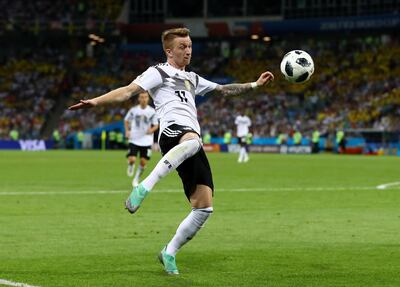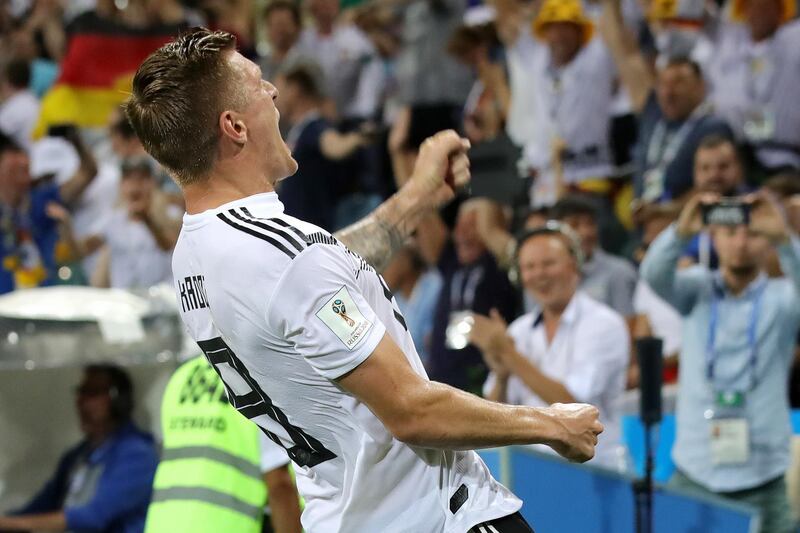Sixty years ago, almost to the day, Sweden knocked West Germany, then the title-holders, out of a World Cup. The game, a semi-final, left a sour taste with losers, which even six decades on, some folk still talk about.
The Germans had a man sent off, for his reaction to a foul on him. Germany’s most famous player, Fritz Walter, limped through the later stages after a heavy challenge on him and there were complaints that the referee had been weak and overwhelmed by a partisan crowd.
This was 1958, when Sweden were the hosts.
Here in 2018, Sweden came as close as they have done since then to ushering some German world champions through the exit gate of a World Cup. They took the lead in Sochi, and, at 1-0 up, Sweden were on course to join Mexico at the top of Group G on maximum points with one match to play.
That would have made themselves and the Mexicans, who beat Germany 1-0 last Sunday, uncatchable. An equaliser early in the second half and a stunning, winning strike from Toni Kroos well into stoppage time have transformed the picture entirely.
Wednesday’s final round of games could still leave the hierarchy utterly altered, but the manner of Germany’s comeback, with Marco Reus equalising Ola Toivonen’s goal and then Kroos stabbing his stiletto into Swedish hearts suggests the champions will cultivate their momentum carefully and very seriously from here on.
Back in 1958, there was some toxic fallout from Sweden 3, West Germany 1 in that Gothenburg semi-final. There were late goals there, too, to reverse a German lead. There was controversy and in the summer that followed Swedish tourists in Germany apparently found themselves subjected to indignities like being refused petrol in service stations, even having the tyres of their cars punctured.
The German press was blamed for exaggerating the fouls and the Swedish aggression. The game was not televised in Germany so people formed their opinions on the basis of what they read and heard on the radio.
When you bag a stoppage-time stunner at the #WorldCup 🙌@ToniKroos
— FIFA World Cup (@FIFAWorldCup) June 23, 2018
👀 TV listings 👉 https://t.co/xliHcxWvEO
📺 Highlights 👉 https://t.co/LOdKDX2Cwn pic.twitter.com/3WEnY29nGz
In 2018, things are different. Everybody sees everything on screen, including a video-assistant referee, although in the first half yesterday, VAR made no intervention following an incident that many Swedish players felt merited a penalty.
Marcus Berg had sped off on a counter-attack, and when Jerome Boateng, pursuing him, caught up he appeared to push the Sweden striker in the back and trip him.
The referee said no penalty, and VAR remained inactive.
“People on my staff who have looked at it say it was a penalty,” Sweden manager Janne Andersson said. “If you have the system, VAR, and the referee on the field feels so confident he doesn’t consult it, it is unfortunate.”
Andersson was crestfallen. His valiant team had lost in stoppage time, and he was angered by the way German coaches and players celebrated at the final whistle in front of his bench. He felt they were bragging, not simply triumphant.
“People behaved in ways you do not do,” he complained. “Some of the group leaders of their team celebrated by running in our direction, rubbing it into our faces by making gestures. That really got me annoyed and angry.”
It had been a night of taut emotions. Sweden’s expertise on the counter-attack had worried Germany and Toivonen’s powerful run, skilled control and neat finish gave them a lead. It rocked Germany.
The response of the champions was to commit more resources to attack, and as Germany manager Joachim Low said afterwards, "not panic".
____________
Read more
World Cup 2018: Day 10 updates - Germany, Mexico and Belgium all triumph
Ronaldo's hat-trick, Musa magic for Nigeria and the 10 best moments of the tournament so far
Messi overreaction, Salah's early exit and 10 worst moments so far
____________

His substitutions showed that, after the insipid, flat and predictable display against Mexico, Low’s Germany do have a Plan B, or rather a Plan A. Marco Reus made his first start in a World Cup match and was excellent, taking his equalising goal well and threatening Sweden throughout with his speed and ingenuity.
Timo Werner had a fine night, especially when he was deployed as a left wing in a forward line that sometimes seemed to comprise seven or eight men, such was the sustained pressure Germany built up in the second half.
With eight minutes left, Boateng was sent off for a second yellow card. Still Germany ploughed men forward. Mario Gomez, a substitute, drew a superb, close-range save from Sweden goalkeeper Robin Olsen; Julian Brandt, another substitute, hit the post and then won the free-kick that would prove the undoing of the Swedes.
Toni Kroos touched it to Reus, who teed it up for Kroos, who had been at fault in the build up to Toivonen’s goal. Kroos then unleashed an arrow past Olsen.
“He [Kroos] normally has 100 per cent accuracy,” remarked Low, who has seen his team, man for man, well below their 100 per cent best in this World Cup.
This revival, this galvanising recovery will, he hopes, be the stimulus for the champions' highest standards to return.






